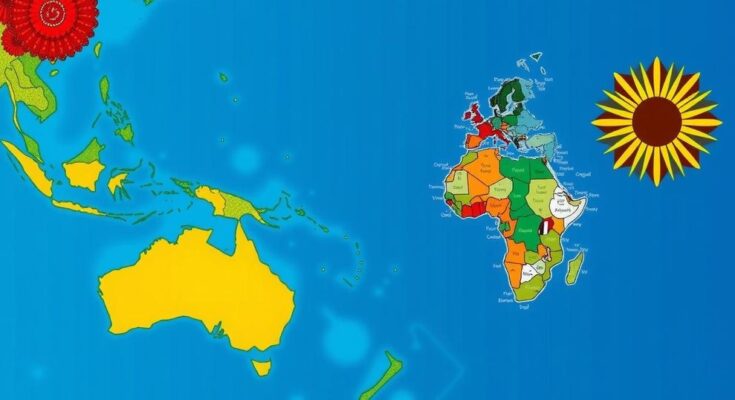At COP29, Small Island Developing States emphasized the critical need for enhanced access to climate finance, highlighting the Commonwealth’s support in facilitating recovery and resilience. With high debt-to-GDP ratios and minimal climate funding allocated to them, SIDS leaders urged increased commitments from global partners to address their urgent challenges and secure their futures.
During the COP29 conference, a pressing theme emerged, emphasizing the necessity for enhanced access to vital climate finance. The Commonwealth, which comprises 33 small states including 25 Small Island Developing States (SIDS), is key to addressing the challenges posed by climate change. These nations, bearing the brunt of rising sea levels and climatic catastrophes, depend on adequate funding for recovery and resilience.
Hon. Lenora Qereqeretabua, Fiji’s Assistant Minister of Foreign Affairs, underscored the importance of dialogue regarding SIDS, stating, “It’s really important that the Commonwealth gave us this special segment on SIDS to talk about these issues because for us, it’s survival.” Fiji’s example highlights the urgent need for support as small island nations face existential threats.
The economic impact of climate change on SIDS is substantial, with their average debt-to-GDP ratio exceeding 64 percent. Alarmingly, these nations receive less than 1 percent of the global climate finance pie, highlighting an urgent need for increased investments. The Commonwealth Climate Finance Access Hub (CCFAH) has thus far mobilized $384 million and aims to secure an additional $500 million to bolster these nations’ responses to climate adversities.
Looking forward to COP30 in Brazil, Hon. Cozier Frederick, Minister of the Environment in Dominica, emphasized the need to advocate for further commitments and to engage actively in new funding entities, such as the Climate Action Fund proposed by Azerbaijan. He remarked, “The Secretariat has to be involved. I think there’s good leadership there. I think small islands, like ours, need the support.”
As leaders of SIDS prepare for future climate discussions, they call for continued advocacy beyond COP30. Hon. Cedric Schuster, Minister of Natural Resources and Environment in Samoa and Chair of the Alliance of Small Island States, expressed that, “The family of the Commonwealth can help us advocate and push a lot for us, including the importance of oceans, but highlighting the vulnerabilities that we have in terms of climate change.”
In response to these requests for support, Commonwealth Secretary-General Rt Hon Patricia Scotland KC assured attendees at COP29 that she would persist in her efforts to secure financing for small island states in pursuit of climate justice, declaring, “The fight against climate change is the fight of our lives.”
The article discusses the significance of climate finance for Small Island Developing States (SIDS) at the COP29 conference, highlighting the role of the Commonwealth in advocating for these nations. It outlines the specific challenges that SIDS face due to climatic changes, such as rising sea levels and limited access to necessary funding. The article reflects on remarks from various officials regarding the urgent need for support and mobilization of resources to foster resilience and recovery in these vulnerable regions.
In conclusion, the urgent call for increased climate finance resonates strongly among Small Island Developing States at COP29. The Commonwealth’s support, through initiatives like the CCFAH, is crucial for enabling these nations to navigate the challenges posed by climate change. Continued advocacy efforts and greater commitments from global leaders are essential to address the financial barriers faced by SIDS, ensuring their survival and resilience in a changing climate.
Original Source: thecommonwealth.org




